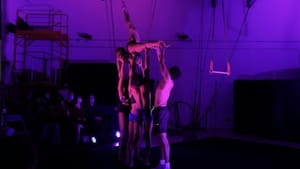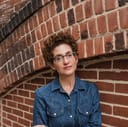Stay in the Loop
BSR publishes on a weekly schedule, with an email newsletter every Wednesday and Thursday morning. There’s no paywall, and subscribing is always free.
Fruit growing on the vine
Philly Fringe 2024: Cannonball Festival presents Tyshaun & Shekinah’s Forbidden Fruit

Exploring Black experiences of body image, mental health, gender, and sexuality, Tyshaun & Shekinah’s Forbidden Fruit was part of the Cannonball Festival’s inaugural Black Circus Week. The event ran from September 6-11, 2024, and its aim was to help Black creatives share work, collaborate, and build community. The project is a co-creation of Cannonball, Rebel Arts Movement, Tauraro Artist Residency, and CSAW, which targets Black and Indigenous circus artists of any discipline and skill level. Initiatives like Black Circus Week continue to establish Cannonball as more fringe than the Fringe Festival and the home of innovation at every level.
Growing pains and gains
Artistic frontiers can be mixed bags, though, and that was the case for Forbidden Fruit, in which a compelling vision was muddled by uneven execution. But a lack of polish is fixable, and this performance has something to say. The show was developed by Tyshaun Thomas and Shekinah Williams, dance/circus artists affiliated with Trenton Circus Squad. It combined circus, movement, and spoken word to portray what Thomas and Williams describe as a “quilt of different experiences.”
Forbidden Fruit consisted of circus and dance/theater vignettes interspersed with recordings. In them, voices of all kinds answered questions about and commenting on their experiences of gender, embodiment, belonging, and sexuality. These were fascinating: the voices discussed experiences of body shame, how the topic of sex was handled while they were growing up, and what they were like as children. Yet the recordings varied in volume and sound quality, and the delivery tended to be flat. Better direction and sound design will help the concept reach its potential.
Similarly, the performance needed more direction and more rehearsal time to iron out kinks. Light, sound, and props all presented issues, such as an extended struggle setting up an aerial hoop between scenes. Problems with pacing and consistency threatened to outweigh Forbidden Fruit’s strengths. Thomas performed with Jamaya Blount, Kordell Garland, Bilal Hailey, Joy Johnson, Kyler Manson, Ahvia Mooring, Breanna Moreland, Aaliyah Oliver, and Shyonn Wright. Some of the artists were skilled, while others hesitated and faltered. A few performers fiddled with their hair, tugged at their costumes, and spoke to one another onstage. A circus scene toward the end suffered from uncertainty and false starts.
The power of circus
The best parts of Forbidden Fruit suggested powerful connections between Black experiences and elements of movement and circus, including balance, strength, inversion, and interdependence. These included a dance duet, a breakdance solo, and aerial routines with hoops and silks. In one scene, an artist juggled clubs with a pill bottle to evoke addiction. A spoken word/theater segment with a mirror had a lot of promise, but the blocking and acting were not up to the challenge. Like many of Forbidden Fruit’s vignettes, this one ended with perplexing abruptness.
Black Circus Week makes you wonder why other organizations, especially those with more resources, have not taken similar steps toward addressing inequities in the arts.
Last year, Cannonball made clear the power of using circus to explore race and gender with Toni Cannon’s ReFlection, an outstanding show that won the 2023 CSAW Award for New Work by a Circus Artist of Color. This year, Black Circus Week offers audiences even more chances to see performances from Black artists. Forbidden Fruit has great ideas that need a little more time to ripen on the vine. Here’s hoping its performers will be back to give Philly another taste.
What, When, Where
Forbidden Fruit. By Tyshaun Thomas and Shekinah Williams. $25. September 9-11, 2024, at Christ Church Neighborhood House, 20 N American Street, Philadelphia. (215) 413-1318 or phillyfringe.org.
Accessibility
Christ Church Neighborhood House is a wheelchair-accessible venue with a portable ramp, but the cobblestones outside may be difficult for some to navigate. Masks are required.
Sign up for our newsletter
All of the week's new articles, all in one place. Sign up for the free weekly BSR newsletters, and don't miss a conversation.

 Melissa Strong
Melissa Strong